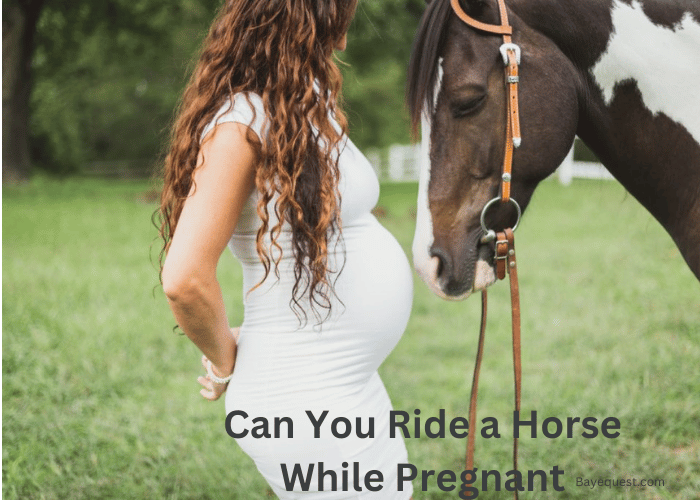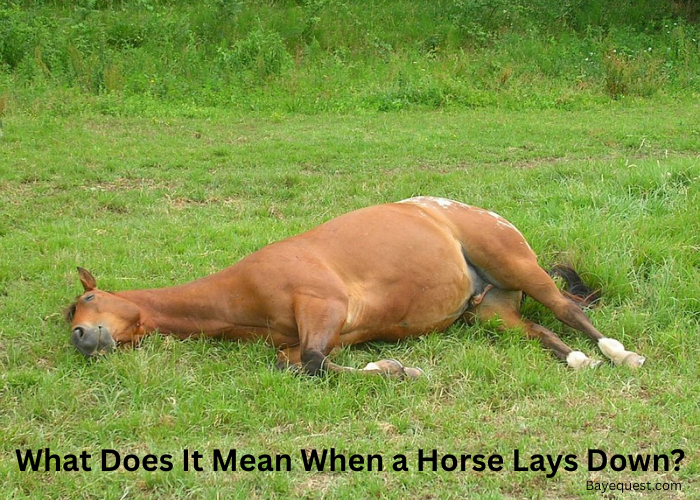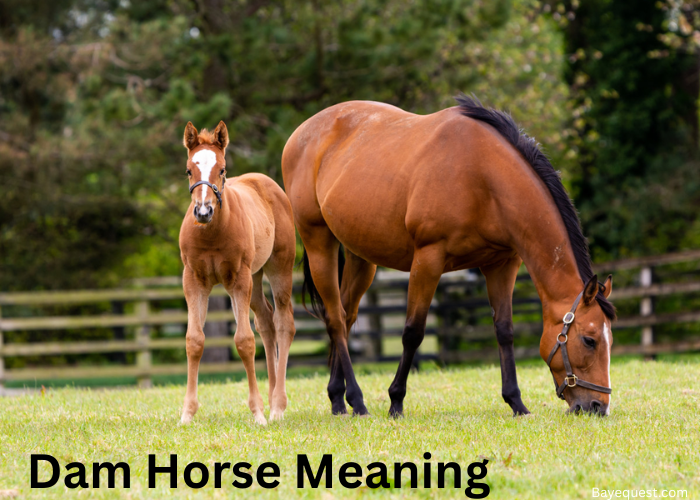Pregnancy is a wild ride on its own. Throw in a horse, and you’ve got quite the adventure.
Can you keep riding while expecting? That’s the big question. It’s not just about loving the saddle; it’s about safety for you and your baby.
Let’s get the facts right, bust some myths, and find out if you can stay in the stirrups while sporting that baby bump. Saddle up, and let’s get started.
Can You Ride a Horse While Pregnant? Key Takeaway
Yes, you can ride a horse while pregnant, but it’s essential to consult with your healthcare provider first. Consider the risks, such as falling and balance issues, and make necessary adjustments to your riding routine to ensure safety for you and your baby.
Is It Safe to Ride a Horse While Pregnant?
It can be, but there are risks. Falling is a big concern. Pregnancy affects your balance and coordination.
Always talk to your doctor first. If you do ride, take it easy. Use a calm, well-trained horse. Stick to safe environments.
Listen to your body and stop if you feel uneasy. Safety for you and your baby comes first.
What Kind of Horse Riding is Safe During Pregnancy?
When you’re pregnant, safe horse riding means taking it slow and steady. Stick to gentle, easy rides.
Choose a calm, well-trained horse. Ride in a controlled environment, like an indoor arena or a quiet trail.
Opt for styles like trail riding, dressage and Western pleasure.
Avoid jumping or galloping. Listen to your body and stop if you feel tired or uncomfortable.
Always check with your doctor before you ride. Safety first for you and your baby.
Read also: Types of Horse Riding Styles.
What Limitations Do You Feel Riding When Pregnant?
Riding when pregnant does come with several limitations and considerations. Here are some of them:
1. Balance and stability
Shifting center of gravity. As your pregnancy progresses, your center of gravity changes, affecting your balance and making it easier to fall.
Increased risk of falling. The altered balance can make you more prone to falls, which can be dangerous for you and your baby.
2. Energy levels
Fatigue. Pregnancy can cause increased fatigue, meaning you might tire more quickly than usual during rides.
Limited endurance. You may not be able to ride for as long as you used to without feeling exhausted.
3. Physical discomfort
Aches and pains. Common pregnancy symptoms, such as back pain, pelvic discomfort, and leg cramps, can make riding uncomfortable.
Growing belly. As your belly grows, it can interfere with your riding posture and ability to move comfortably in the saddle.
4. Risk of injury
Higher stakes. Any fall or injury can have serious consequences during pregnancy, not just for you but also for your developing baby.
Emergencies. In an emergency, your response time and ability to dismount quickly might be compromised.
5. Health conditions
Pregnancy complications. Conditions like placenta previa, preeclampsia, or a history of preterm labor can make riding unsafe.
Doctor’s advice. Your healthcare provider might advise against riding if they believe it poses a risk based on your medical history.
6. Anxiety and stress
Increased worry. You might feel more anxious about the risks involved, which can affect your enjoyment and performance while riding.
Concentration issues. Pregnancy brain (forgetfulness and difficulty concentrating) can make focusing harder, which is essential for safe riding.
7. Horse and environment
Calm horse required. You’ll need a particularly calm and well-trained horse to minimize risks, which might not always be available.
Safe riding environment. You should ride in a controlled environment, like an indoor arena, which may limit your usual riding locations.
8. Adaptations needed
Riding gear. Your regular riding gear might not fit as well, and you might need to invest in new, more comfortable equipment.
Modified riding style. You may need to adjust your riding style and routines, avoiding jumps, fast-paced riding, or rough terrains.
9. Support system
Need for assistance. You might require more assistance getting on and off the horse, and having someone around in an emergency is crucial.
Availability of help. Finding reliable help or a riding buddy who understands your needs can be challenging.
Benefits of Riding a Horse While Pregnant
Riding a horse while pregnant can have several benefits, but you must be mindful of your body and health. Here are some more detailed benefits:
Physical Fitness
1. Maintains muscle tone. Riding engages core, leg, and back muscles, helping to keep them strong and toned.
2. Improves balance and coordination. Regular riding can help maintain balance and coordination, which are often challenged during pregnancy.
3. Cardiovascular health. Riding at a moderate pace can provide a good cardiovascular workout, improving heart health.
Mental Well-being
4. Reduces stress. The rhythm of riding and being outdoors can reduce stress levels and promote relaxation.
5. Boosts mood. Interacting with your horse and spending time in nature can boost your mood and overall mental health.
6. Sense of normalcy. Continuing with a familiar routine can provide comfort and stability during a change.
Bonding and Routine
7. Strengthens your bond with your horse. Spending time with your horse can deepen your bond and provide emotional support.
8. Sense of continuity. Keeping up with regular riding sessions can help maintain a sense of normalcy and continuity in your life.
Low-impact Exercise
9. Gentle exercise. Riding can be a low-impact form of exercise if done at a slow, controlled pace.
10. Flexibility in intensity. You can adjust the intensity of your riding to suit your energy levels and comfort.
Personal Enjoyment
11. Personal fulfillment. Riding is often a source of joy and personal fulfillment, contributing to overall happiness.
12. Outdoor activity. Being outdoors can provide additional health benefits, such as fresh air and exposure to nature.
Interesting read: How Many Months Does a Horse Stay Pregnant?
What to Expect in the Pregnancy Stages as You Horse Ride
As your pregnancy progresses, physical changes and safety considerations will vary. Here’s a brief overview of what to expect in each trimester:
First trimester
During the first trimester, you might experience common pregnancy symptoms. These can impact your energy levels and concentration, making riding more challenging.
However, physical changes are minimal at this stage, so your body might still feel normal. Focus on safety during this period.
Stick to riding calm, well-trained horses in controlled environments, and avoid high-risk activities. Listen to your body and take breaks if you feel tired or uncomfortable.
Second trimester
The second trimester often brings a boost in energy, making it a more enjoyable time for many pregnant riders. However, your abdomen starts to grow, which can slightly affect your balance and posture in the saddle.
Adjust your riding gear for comfort, opting for more accommodating clothing. Continue riding calm horses and stick to safer, slower riding styles.
Avoid activities that could jolt or jostle you too much. Pay attention to your body’s signals and maintain a comfortable riding experience.
Always keep safety in mind and consult your doctor regularly.
Third trimester
In the third trimester, your belly will be significantly larger. This will greatly affects your balance and comfort while riding.
You may also experience increased fatigue and physical discomfort. Due to the higher risk of falling and potential harm to the baby, healthcare providers will recommend stopping riding.
Instead, consider engaging in groundwork with your horse or other low-impact activities. If you choose to ride, do so under controlled conditions and only for short, gentle sessions.
Always prioritize your safety and your baby’s, and consult your doctor before riding.
Precautions to Take as You Ride When Pregnant
Riding a horse while pregnant can be safe and enjoyable if you take the right precautions. Here are some important precautions to remember while you ride during pregnancy.
Consult your healthcare provider. Always get approval from your OB-GYN or midwife before continuing or starting to ride. Keep your healthcare provider updated on your riding activities and any changes in your health.
Ride a calm, well-trained horse. Choose a horse with a gentle temperament to minimize the risk of accidents. A calm horse is less likely to spook, reducing the chance of falls.
Ride in a controlled environment. Ride in safe, familiar environments like indoor arenas or well-maintained trails. Avoid unfamiliar or rough terrain that can pose additional risks.
Modify intensity. Stick to low-impact riding styles and avoid jumping, galloping, or strenuous activities. Gentle riding is safer and more comfortable as your pregnancy progresses.
Shorter sessions. Limit the duration of your rides to avoid excessive fatigue and discomfort. Shorter sessions help prevent overexertion and keep you feeling well.
Pay attention to signals. Stop riding immediately if you feel pain, dizziness, or unusual symptoms. Your body will signal when it’s time to rest or stop.
Stay comfortable. Wear comfortable, well-fitting riding gear that accommodates your changing body. Proper gear ensures better support and reduces discomfort.
Stay grounded. Consider alternative activities such as groundwork or grooming on days when riding feels too risky. These activities keep you connected to your horse without the added risk.
Emergency preparedness. Always have a riding buddy or someone nearby in case of an emergency. Having assistance readily available ensures quick help if needed.
Stay hydrated. Drink plenty of water before, during, and after your rides. Hydration is crucial to maintaining energy levels and overall health.
Balanced diet. Eat well to maintain your energy levels. Proper nutrition supports your health and your baby’s development.
Take breaks. Allow yourself regular breaks to avoid overexertion. Frequent breaks help manage fatigue and keep you comfortable.
Rest days. Incorporate rest days into your routine to recover and maintain your health. Rest days are essential for physical and mental well-being.
Warning Sign to Stop Riding at Any Stage of Pregnancy
Recognizing warning signs while riding during pregnancy is crucial for your safety and your baby’s well-being. If you experience the following symptoms, stop riding immediately and seek medical advice.
- Pain: Sharp or persistent pain.
- Dizziness or lightheadedness: Increased risk of falling.
- Shortness of breath: Severe shortness of breath.
- Vaginal bleeding or spotting: Any form of bleeding or spotting.
- Uterine contractions: Contractions or cramping.
- Decreased fetal movement: Significant decrease in baby’s movements.
- Severe swelling: Sudden or severe swelling in legs, hands, or face.
- Vision changes: Blurred vision or seeing spots.
- High blood pressure: Unusually high blood pressure or feeling weak.
- Fluid leakage: Leaking amniotic fluid.
Do Horses Act Differently With You While Pregnant?
Horses can often sense changes in their human companions, including pregnancy. Some horses may become more gentle and protective, displaying calm and cautious behavior around pregnant riders.
They might be more attentive to your commands and movements, sensing the need to be careful.
On the other hand, some horses may become more curious or even slightly anxious due to the unfamiliar scent and changes in their body language.
Each horse is different, and their reactions can vary. Observe your horse’s behavior closely and ensure a safe and comfortable riding experience for both of you.
Alternatives to Horse Riding When Pregnant
Staying active during pregnancy is important, but horse riding may not always be safe. Luckily, there are several alternative activities that can help you maintain fitness and stay connected with your horse.
Here are some great options to consider:
- Groundwork: Engage in leading, lunging, and training exercises from the ground.
- Grooming: Spend time grooming your horse for relaxation and bonding.
- Walking with your horse: Take your horse for walks to stay active.
- Swimming: Enjoy cardiovascular benefits and muscle tone without joint strain.
- Prenatal yoga: Improve flexibility, strength, and relaxation.
- Prenatal pilates: Strengthen your core and improve posture.
- Stationary biking: Get a safe, low-impact cardio workout.
Read also: Is Horse Riding a Sport?
Conclusion
Riding a horse while pregnant can be an amazing experience if done right. Safety comes first, always. Listen to your body and consult your doctor.
Choose calm horses and controlled environments. If riding feels too risky, try groundwork or other low-impact activities.
Your bond with your horse doesn’t have to end just because you’re expecting.
Keep things gentle, keep things fun, and most importantly, keep yourself and your baby safe. Happy trails to you and your growing family.








